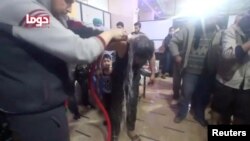U.S. Defense Secretary Jim Mattis says the United States is not ruling out military action against Syria after President Donald Trump tweeted there would be a "big price to pay" for what he called the "mindless chemical attack" Saturday.
"The first thing we have to look at is why are chemical weapons still being used at all when Russia was the framework guarantor of removing all the chemical weapons," Mattis said, as he met with Qatari Emir Sheikh Tamim bin Hamad al-Thani at the Pentagon Monday. Mattis told reporters the U.S. is “working with our allies and partners from NATO to Qatar and elsewhere; we are going to address this issue."
Late Sunday, the White House said Trump and French President Emmanuel Macron strongly condemned chemical attacks in Syria and agreed Syrian President Bashar al-Assad's government "must be held accountable for its continued human rights abuses." "They agreed to exchange information on the nature of the attacks and coordinate a strong, joint response," the White House said in a statement on the phone call between the two leaders.
Syria has denied using chemical weapons throughout the conflict that began in 2011, including the most recent suspected chemical attack Saturday in a rebel-held suburb of Damascus that killed at least 40 people. Russia said there is no evidence Syria carried out such an attack.
The U.S. president has blamed Assad for the attack and in a rare direct condemnation of Russia's leader Vladimir Putin, Trump tweeted Sunday that "President Putin, Russia and Iran are responsible" for their support of "Animal Assad."
The United Nations Security Council will meet Monday about the alleged attack, after multiple countries demanded an urgent session. The European Union said "evidence points toward yet another chemical attack" by the Syrian regime.
Israeli strikes
Meanwhile, Syria and Russia say two Israeli war planes operating in Lebanese air space carried out an attack early Monday on an air base in central Syria.
Israel's military did not comment on the strikes against the T4 base in Homs province.
The Britain-based Syrian Observatory for Human Rights said 14 people were killed, including Iranian forces.
In February, Israel accused Iranian forces of using the same site to launch a drone into Israeli territory. It responded by attacking Syrian air defense and Iranian military targets within Syria, and Israeli Prime Minister Benjamin Netanyahu pledged to "continue to harm anyone who tries to harm us."
Initial Syrian state media reports Monday blamed the United States, which along with France denied responsibility.
The alleged chemical attack occurred late Saturday amid new attacks on the last rebel enclave in eastern Ghouta.
First responders said they discovered families suffocated in their homes and shelters with foam on their mouths. Relief workers said more than 500 people, mostly women and children, were brought to medical centers with difficulty breathing, foaming at the mouth and their eyes burning.
The Civil Defense and Syrian American Medical Society said patients gave off a chlorine-like smell, and some had blue skin, an indication of oxygen deprivation.
"Dropping poison gas in a way that attacks women and children down in the shelters is a way to try to panic the civilians into leaving and cut the ground underneath the rebels," University of Pennsylvania political science professor Ian Lustick told VOA.






